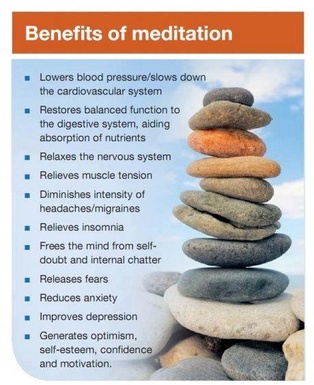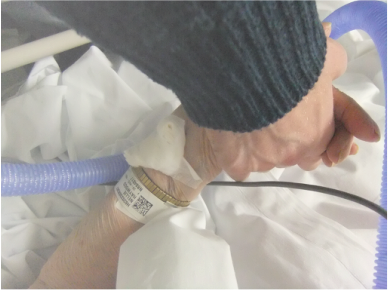 I have written often of the benefits of meditation, particularly when combined with music as a guided meditation experience. Now there is increasing evidence from mainstream medical research of what has been understood for thousands of years by wise teachers of many traditions: meditation is great for people! The truly excellent thing about meditation is that anyone can do it, pretty much anywhere. It is easy, free (or very inexpensive if you choose to buy CDs or download guided versions), is proven as effective as pharmaceutical aids in reducing depression and stress, and has no side effects other than an increased sense of well-being and peacefulness. Click here to see the research done at Johns Hopkins investigating meditation as anti-depressant. What's not to love about that? The Mayo Clinic also published a newsletter article titled "Meditation: A simple, fast way to reduce stress" which gives an great overview of the subject . Various forms of meditation have been taught, mostly in eastern cultures, and the practice has been growing by leaps and bounds in the west over the past thirty years or so. There have been a number of pioneeers in bringing the practice of mindfulness-based stress reduction (MSBR) to the west, including Jon Kabat-Zinn who founded the Stress Reduction Clinic and Center for Mindfulness in Medicine, Health Care, and Society at the University of Massachusetts Medical School. His clinic was featured on the public television series Healing and the Mind with Bill Moyers in 1993. Meditation has such incredible benefits that I believe everyone can find some help by practicing it. In my own experience as a caregiver, meditation and music, combined with fervent and frequent prayer, saved my sanity when it was hanging by a thread. I find it compelling that the list of benefits meditation offers so exactly corresponds to symptoms many (or most) caregivers experience. The only mystery to me is why more caregivers don't use this incredible tool for balance and strength. Which is why I am making it my mission to get this information out to those who need it through this website & blog, by writing, speaking, teaching, and otherwise promoting it. How often is there a perfect solution to so many of our everyday stresses just waiting for us to sit down and get quiet long enough to find its gifts? If you'd like to explore the ideas and resources for meditation, please visit my Meditation and Music page on this site and also take a look at the ideas for Self-care and Caregiver Resource Store. I will also be publishing a book which further details resources and tools for caregivers: Sanity Savers for Caregivers at the End of Their Rope. You can add your name for an announcement of publication, which is targeted for March 2014. If you would like to read a chapter from the book about the uses of music and meditation, click here. I encourage you to explore the idea of various forms of meditation and find what appeals to you personally. In my 17 years of caregiving, music and meditation were the brightest jewels in the caregiver crown. Try it out. You have nothing to lose and so very much to gain! 9/6/2012 Caring in the HospitalOne of the most challenging caregiving experiences can happen, ironically, when your loved one is admitted to someone else's care: ie. the hospital, rehab or nursing home. In my own 17-year caregiving journey, my mother was only admitted to a hospital three times, two of those during the last 7 months of her life. Each time it was very traumatic (for both of us!), but what I found so stupefying was the total inconsistency of the quality of care. The difference was dramatic, both from hospital to hospital and even from floor to floor of the same hospital! It covered the whole spectrum between basically decent to almost criminally negligent. From these experiences, which I will not share in gruesome detail, I found three nuggets of truth to be evident:
1) Hospitals are not good places for the elderly, and are especially bad for those with any type of dementia. Anytime someone is in pain or physical distress, it clouds their thinking capabilities, and if drugs are given, they can intensify this effect. Same goes for the changes in routine, unfamiliar surroundings and upset in sleep patterns that happen in hospitals. In fact, according to a recent study, a hospital stay can actually be a causal factor, triggering dementia in the elderly, if delirium is present during the hospitalization. The article in Science Daily explains the long-term effects and also gives some ways to help avoid delirium and consequent cognitive decline: Delirium and Long-Term Cognitive Decline in Alzheimer's Patients Linked in New Study http://www.sciencedaily.com/releases/2012/08/120820161009.htm So, for the sake of all concerned, take whatever steps are possible to minimize or altogether avoid hospital admissions. For example, during one emergency, I waited with my mother for over 5 hours in the hospital ER waiting room, only to find there were still several people (and hours of waiting) ahead of us. Because I knew Mom was in a weak and debilitated condition, getting worse by the minute, I called the local walk-in clinic. They had no one waiting, took her in within two minutes of arrival, examined and treated her in less than an hour. She improved dramatically by the following day, when I was able to get her in to see her regular doctor. We thus avoided what would have likely been an unnecessary hospitalization. That was a very valuable lesson. Obviously, you have to use best judgement as to the severity of the problem. It's always best to call 911 if you have a true life-threatening emergency, but consider the risks against the benefits for less threatening circumstances. Another time, we waited over 11 hours in the emergency room, much of it with me sitting on a cold hard floor next to her gurney because they didn't "allow" family to be in there. I had to explain repeatedly that her mental status required my presence, since she couldn't answer questions or give a medical history. They eventually brought me a chair when they realized I wasn't going away, no matter what they said. (This was less an act of kindness than that they just got tired of tripping over me). This marathon ER experience happened in 2003, and I truly hope that hospital staff has become more aware of and sensitive to the needs of elderly dementia patients to have their caregivers present in these very upsetting and frightening situations. 2) The elderly are at risk for falling in many cases, and that risk increases when they are in a hospital setting. In fact, my mother's first fall, after living with us for nearly 8 years without a mishap, was when she was in the hospital. She was disoriented, on IV and yet managed to get out of bed to try to get to the bathroom on her own. She fell, but thankfully was only banged up a bit and didn't suffer any major trauma or broken bones. It was a wake up call for me! So, my advice would be to stay with your loved one as much as possible, and if you can afford it, hire extra care so that someone is in attendance when you cannot be there. If you can't afford this (it's quite expensive!) you can arrange for friends, church members, and/or other family members to volunteer so that there is adequate coverage. You will need to see to personal hygiene, such as brushing teeth (or cleaning dentures), shaving, putting in and removing hearing aids, and sometimes even bathing your loved one, depending on the staff (or lack thereof) in the particular facility. But don't expect the care to just happen. It won't. Doing it yourself insures that your loved one's basic needs are met and they can be comfortable. I also believe it helps them tremendously to remain "in touch" with you, quite literally. 3) And lastly, do whatever you must to "catch" the doctor while making rounds. Be sneaky, lie in wait. This may require being in the hospital room by 7 am or earlier, since many doctors do rounds before starting an office schedule. Ask the nurses what time a doctor normally sees patients and make your ambush plans accordingly. You want to communicate, question, understand treatment plans and diagnosis/prognosis. A new trend in so-called "care" involves having a "hospitalist" -- a doctor that is specifically assigned from a practice to care for all hospitalized patients from that practice. This makes absolutely no sense, since the attending physician may know nothing about the patient, having never seen them prior. If there is dementia or even just normal disorientation resulting from the injury or illness requiring hospitalization, the patient can't give vital information to assist with treatment or diagnosis, nor can they, in the case of Alzheimer's, even answer the most basic questions. This becomes downright dangerous to the patient, and I'm sure is frustrating for the doctor, too. Hence my advice to lie in wait if you have to, in order to ask questions and interact with the doctor in person. It is my firm belief, after witnessing some harrowing hospital horrors, that everyone needs an advocate to intercede on their behalf. As an advocate, you need to be very clear and specific in asking about any drugs that are being given, or considered, and what the risks vs. benefits are, as it can be a devastating ordeal if inappropriate medications are ordered. Case in point: Anti-psychotic drugs, such as Haldol (halperidol) are all too often given to Alzheimer's patients with sometimes deadly results. I have personal experience of this with two elderly relatives. The consequences were tragic. There is an excellent blog post on this very subject at the Mayo Clinic Alzheimer's Caregiver Newsletter, which I will share here: http://www.mayoclinic.com/health/antipsychotics-and-alzheimers/MY02213/ Forewarned is forearmed, though it is such a shame to have to think of a hospitalization in terms of doing battle. Unfortunately, that is often the true nature of care in our present system. To be fair, there are still a few rare, white knights disguised as doctors, riding in with the best ideals, and highest standards. But, they are sadly more fictional than real these days. If you are fortunate enough to find one of these very special health care professionals, give thanks, hold on and don't let go! 6/21/2012 Yoga and Back CareOne of the most debilitating injuries a caregiver can face is a back injury. You are already under great stress in taking good care of your loved one, and it often involves lifting, turning, moving, or supporting them in transit (not to mention lifting equipment such as a wheelchair, walker, etc.) in and out of vehicles or transfers from bed to chair or shower. In light of this, it makes perfect sense to strengthen your back as much as possible and protect it against injury. Yoga is one of the most useful practices for this particular need. And it has excellent side benefits of relaxation, stress relief, and promoting a sense of wellbeing.
Many of the stretches and postures used in yoga can help to keep the back supple and strong. There are many excellent videos available if you just don't have time to spare for a class, or can't get coverage to be away for that time. (There really is no substitute for a good yoga teacher and class, but a video is certainly better than not protecting your back at all!!) The video that I found most useful is one by Rodney Yee, entitled: Yoga for Back Care. It is available on DVD from Gaiam.com at the following link: Yoga for Back Care There are also several other products you might find helpful. One is created by the Mayo Clinic, also available at Gaiam.com. Mayo Clinic Wellness Solutions for Back Pain It is crucial to find a method of stress relief and body care that feels good, is right for you, and works -- so that you will be encouraged to keep doing it. For me, that is yoga. Try one of these, or some other yoga video or class, if that's more appealing. Just do something proactive today for your own health, wellness and stress relief. 5/2/2012 Computers & ExerciseI just read an interesting article about a research study done by the Mayo Clinic in Rochester, MN, which is featured on the research page of this blog. The study concludes that computer use in combination with exercise had a significant and positive result in helping preserve the memory of participants, aged 70 - 93. Though I don't fall into that age group yet, I was encouraged that I've at least got half of that right -- betcha can't guess which half.
It was interesting to me in that I have never seen those particular two aspects studied together. Brain stimulation has long been touted as helping neuroplasticity (which is pretty much what you'd imagine -- keeping your neural pathways working keeps them more flexible). But it's gratifying to baby boomers everywhere who spend lots of time at a computer keyboard, that this can also be helping to keep your brain active and your memory intact. Now we just have to remember to get up from the computer, stretch, breathe deeply and take a brisk walk every couple of hours. At least it's hopeful news. I'm inspired and I hope you are, too! I really love it when something I enjoy actually turns out to be good for me, don't you? Like dark chocolate as an antioxidant. Ahh, yes. But that probably deserves a post unto itself. |
About Karen
Karen is a compassionate, enthusiastic student of life, who cared for her mother for 17 years. She brings her insights, compassion, experience and desire to share knowledge and healing to this ongoing conversation with others on the caregiving path. If you are caring for a parent, spouse, friend or other loved one this site offers sanity-saving tips, open-hearted self-care ideas, and an open forum for discussion, connection and sharing resources for the journey. Archives
October 2021
CategoriesAll Acceptance Aging Together Alan Cohen Alive Inside Movie Alzheimer's Alzheimer's Prevention A Mind Of Your Own Anxiety Aromatherapy Audio Therapy For PTSD Austin Air Hepa Filter Autism Back Care Video Beginner's Mind Being Present Blessing For Caregivers Books Brain Insulin Butterfly Story Calm Calm.com App Care For Veterans Caregiver Advocate Caregiver Coalition Caregiver Comfort Kit Caregiver Guilt Caregiver Retreat Caregiver's Serenity Prayer Caregiver Stress Caregiver Support Care Giving Caregiving Vulnerability Care In Hospital Caterpillar Into Butterflies Chamomile Tea Cindy Laverty Comedian Computers & Exercise Crisis Dan Cohen Deepak Chopra Delirium Depression Diabetes Disaster Preparedness Distractions Dr. Dharma Singh Khalsa Dr. Oliver Sacks Eden Alternative Eldershire Elizabeth Dole Foundation Emergency Planning Emergency Preparation Emerson End Of Caregiving Enough Already Escapism Essential Oils Food Safety Forgiveness Funny Stories Gaiam.com Gail Sheehy Gift Of Alzheimer Gift Of Healing Presence GMO Food Green House Project Gregory Fricchione Md Grief Guilt Happy Light Healing Holding Hands Home As Sanctuary Hope Hospital Caregiving Hospital Stay Humor Inspirational Reading Ipods For Nursing Homes Isolation Jacksonville James E. Miller John Denver Johns Hopkins Study John T. McFadden Jon Kabat-Zinn Kelly Brogan Kirtan Kriya Meditation Lao Tzu Laugh Laughter Lavender Loneliness Loss Of Purpose Love Love In The Nursing Home Maya Angelou Mayo Clinic Mayo Clinic Alzheimer's Blog MD Meditation Meditation Garden Melatonin Memory Memory Cafe Military Caregiver Mindfulness Meditation Mr. Bean Music Music & Alzheimer Music And Memory Neurological Research Noise Pollution Operation Family Caregiver Opportunity Overnight Respite Care Pandemic Passages In Caregiving Patience Paul Coelho Peace Post-traumatic Stress Disorder Power Of Love Prayer PTSD Quality Of Sleep Radical Contentment Relaxation Releasing Problems Renewal Research Respite Rewind Rodney Yee Rosalynn Carter Rosalynn Carter Institute For Caregiving Rowan Atkinson Sanctuary Sanity Self Care Serenity Silence Sleep Slowing Time Solutions Soothing Music Stress Stress Relief Sun Sunshine Support For Caregivers Tai Chi Thanksgiving The Care Company The Kiss Time Traumatic Brain Injury Travel With Alzheimer's Person Treat VA Caregivers Valentine's Day Verilux Veteran Farms Veterans Veteran Suicide Vitamin D Wayne W. Dyer Wellness Wendell Berry White Noise William H. Thomas Worry Yoga Yoga Video |


